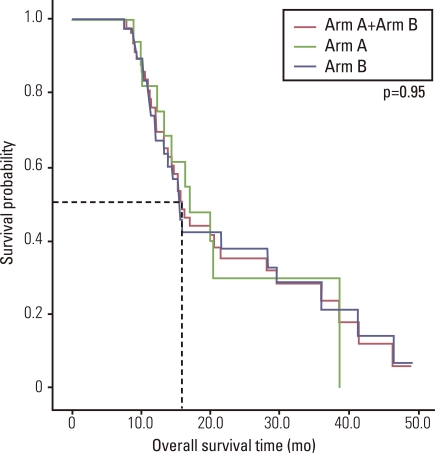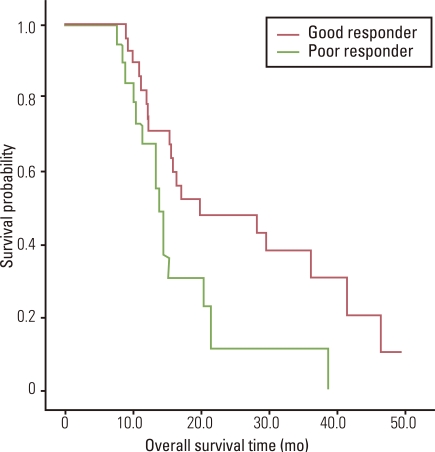Cancer Res Treat.
2011 Dec;43(4):236-243.
Prognostic Factors of Second and Third Line Chemotherapy Using 5-FU with Platinum, Irinotecan, and Taxane for Advanced Gastric Cancer
- Affiliations
-
- 1Department of Internal Medicine, Gangnam Severance Hospital, Yonsei University College of Medicine, Seoul, Korea. chojy@yuhs.ac
- 2Gastric Cancer Center, Gangnam Severance Cancer Hospital, Seoul, Korea.
- 3Division of Medical Oncology, Department of Internal Medicine, Gangnam Severance Hospital, Yonsei University College of Medicine, Seoul, Korea.
- 4Department of Pathology, Gangnam Severance Hospital, Yonsei University College of Medicine, Seoul, Korea.
- 5Department of Surgery, Gangnam Severance Hospital, Yonsei University College of Medicine, Seoul, Korea.
Abstract
- PURPOSE
The aims of this study are to find out whether the sequence of chemotherapeutic regimens including second- and third-line taxane and irinotecan influences the survival of patients with unresectable gastric carcinoma and to identify clinical characteristics of patients with improved response.
MATERIALS AND METHODS
Fifty gastric carcinoma patients who were treated by third-line sequential chemotherapy between November 2004 and July 2010 were enrolled in this study. Their overall survival (OS) and time to progression (TTP) were set up as primary and secondary end points. For the sequence of chemotherapy regimen, two arms were used. Arm A was defined as 5-fluorouracil (5-FU)+cisplatin (FP) or folinic acid, 5-FU and oxaliplati (FOLFOX), followed by folinic acid, 5-FU and irinotecan (FOLFIRI), and paclitaxel or docetaxel plus 5-FU, with or without epirubicin. Arm B was defined as FP or FOLFOX, followed by paclitaxel or docetaxel plus 5-FU, and FOLFIRI.
RESULTS
The median OS of all patients was 16.0 months (95% confidence interval, 13.6 to 18.3 months), which is longer than historical control of patients who did not receive third-line chemotherapy. The sequence of second and third-line regimen, including irinotecan and taxane, did not present significant difference in OS or TTP after failure of 5-FU with platinum chemotherapy. In survival analysis of patients' clinicopathologic characteristics, poor prognosis was shown in patients with poorly differentiated histologic features, elevated serum carcinoembryonic level, and shorter TTP of first line chemotherapy.
CONCLUSION
It is possible for patients to respond differently to chemotherapy due to differences in clinical features and underlying gene expression profiles. Development of individualized chemotherapy regimens based on gene expression profiles is warranted.
Keyword
MeSH Terms
-
Arm
Bridged Compounds
Camptothecin
Epirubicin
Fluorouracil
Humans
Leucovorin
Organoplatinum Compounds
Paclitaxel
Platinum
Prognosis
Salvage Therapy
Stomach Neoplasms
Taxoids
Thymine Nucleotides
Transcriptome
Bridged Compounds
Camptothecin
Epirubicin
Fluorouracil
Leucovorin
Organoplatinum Compounds
Paclitaxel
Platinum
Taxoids
Thymine Nucleotides
Figure
Reference
-
1. Jemal A, Bray F, Center MM, Ferlay J, Ward E, Forman D. Global cancer statistics. CA Cancer J Clin. 2011; 61:69–90. PMID: 21296855.
Article2. Jung KW, Park S, Kong HJ, Won YJ, Lee JY, Park EC, et al. Cancer statistics in Korea: incidence, mortality, survival, and prevalence in 2008. Cancer Res Treat. 2011; 43:1–11. PMID: 21509157.
Article3. Ajani JA. Evolving chemotherapy for advanced gastric cancer. Oncologist. 2005; 10(Suppl 3):49–58. PMID: 16368871.
Article4. Wilson D, Hiller L, Geh JI. Review of second-line chemotherapy for advanced gastric adenocarcinoma. Clin Oncol (R Coll Radiol). 2005; 17:81–90. PMID: 15830569.
Article5. Moon YW, Rha SY, Jeung HC, Kim C, Hong MH, Chang H, et al. Outcomes of multiple salvage chemotherapy for advanced gastric cancer: implications for clinical practice and trial design. Cancer Chemother Pharmacol. 2010; 66:797–805. PMID: 20221831.
Article6. Jeong J, Jeung HC, Rha SY, Im CK, Shin SJ, Ahn JB, et al. Phase II study of combination chemotherapy of 5-fluorouracil, low-dose leucovorin, and oxaliplatin (FLOX regimen) in pretreated advanced gastric cancer. Ann Oncol. 2008; 19:1135–1140. PMID: 18272910.
Article7. Glimelius B, Ekström K, Hoffman K, Graf W, Sjödén PO, Haglund U, et al. Randomized comparison between chemotherapy plus best supportive care with best supportive care in advanced gastric cancer. Ann Oncol. 1997; 8:163–168. PMID: 9093725.
Article8. Ji SH, Lim do H, Yi SY, Kim HS, Jun HJ, Kim KH, et al. A retrospective analysis of secondline chemotherapy in patients with advanced gastric cancer. BMC Cancer. 2009; 9:110. PMID: 19358705.
Article9. Kanagavel D, Pokataev IA, Fedyanin MY, Tryakin AA, Bazin IS, Narimanov MN, et al. A prognostic model in patients treated for metastatic gastric cancer with second-line chemotherapy. Ann Oncol. 2010; 21:1779–1785. PMID: 20150573.
Article10. Jo JC, Lee JL, Ryu MH, Sym SJ, Lee SS, Chang HM, et al. Docetaxel monotherapy as a second-line treatment after failure of fluoropyrimidine and platinum in advanced gastric cancer: experience of 154 patients with prognostic factor analysis. Jpn J Clin Oncol. 2007; 37:936–941. PMID: 18211985.
Article11. Satoh S, Kawashima K, Matsumoto S, Hasegawa S, Okabe H, Nomura A, et al. Retrospective evaluation of sequential outpatient chemotherapy for advanced gastric cancer. Chemotherapy. 2007; 53:226–232. PMID: 17356271.
Article12. Seo MD, Lee KW, Lim JH, Yi HG, Kim DY, Oh DY, et al. Irinotecan combined with 5-fluorouracil and leucovorin as second-line chemotherapy for metastatic or relapsed gastric cancer. Jpn J Clin Oncol. 2008; 38:589–595. PMID: 18772169.
Article13. Kim SH, Lee GW, Go SI, Cho SH, Kim HJ, Kim HG, et al. A phase II study of irinotecan, continuous 5-fluorouracil, and leucovorin (FOLFIRI) combination chemotherapy for patients with recurrent or metastatic gastric cancer previously treated with a fluoropyrimidine-based regimen. Am J Clin Oncol. 2010; 33:572–576. PMID: 20042971.
Article14. Takiuchi H, Goto M, Imamura H, Furukawa H, Imano M, Imamoto H, et al. Multi-center phase II study for combination therapy with paclitaxel/doxifluridine to treat advanced/recurrent gastric cancer showing resistance to S-1 (OGSG 0302). Jpn J Clin Oncol. 2008; 38:176–181. PMID: 18281707.
Article15. Kim JA, Lee J, Han B, Park SH, Park JO, Park YS, et al. Docetaxel/cisplatin followed by FOLFIRI versus the reverse sequence in metastatic gastric cancer. Cancer Chemother Pharmacol. 2011; 68:177–184. PMID: 20878159.
Article16. Shim HJ, Yun JY, Hwang JE, Bae WK, Cho SH, Chung IJ. Prognostic factor analysis of thirdline chemotherapy in patients with advanced gastric cancer. Gastric Cancer. 2011; 14:249–256. PMID: 21431297.
Article17. Catalano V, Graziano F, Santini D, D'Emidio S, Baldelli AM, Rossi D, et al. Second-line chemotherapy for patients with advanced gastric cancer: who may benefit? Br J Cancer. 2008; 99:1402–1407. PMID: 18971936.
Article18. Piessen G, Messager M, Leteurtre E, Jean-Pierre T, Mariette C. Signet ring cell histology is an independent predictor of poor prognosis in gastric adenocarcinoma regardless of tumoral clinical presentation. Ann Surg. 2009; 250:878–887. PMID: 19855261.
Article19. Hyung WJ, Noh SH, Lee JH, Huh JJ, Lah KH, Choi SH, et al. Early gastric carcinoma with signet ring cell histology. Cancer. 2002; 94:78–83. PMID: 11815962.
Article20. Zhang YH, Li Y, Chen C, Peng CW. Carcinoembryonic antigen level is related to tumor invasion into the serosa of the stomach: study on 166 cases and suggestion for new therapy. Hepatogastroenterology. 2009; 56:1750–1754. PMID: 20214231.21. Park SH, Ku KB, Chung HY, Yu W. Prognostic significance of serum and tissue carcinoembryonic antigen in patients with gastric adenocarcinomas. Cancer Res Treat. 2008; 40:16–21. PMID: 19688060.
Article22. Shah MA, Khanin R, Tang L, Janjigian YY, Klimstra DS, Gerdes H, et al. Molecular classification of gastric cancer: a new paradigm. Clin Cancer Res. 2011; 17:2693–2701. PMID: 21430069.
Article23. Ueda K, Iwahashi M, Nakamori M, Nakamura M, Matsuura I, Yamaue H, et al. Carcinoembryonic antigen-specific suicide gene therapy of cytosine deaminase/5-fluorocytosine enhanced by the cre/loxP system in the orthotopic gastric carcinoma model. Cancer Res. 2001; 61:6158–6162. PMID: 11507067.
- Full Text Links
- Actions
-
Cited
- CITED
-
- Close
- Share
- Similar articles
-
- Chemotherapy for Advanced Gastric Cancer: Slow but Further Progress
- Treatment for unresectable gastric cancer
- Irinotecan Monotherapy Versus Irinotecan-Based Combination as Second-Line Chemotherapy in Advanced Gastric Cancer: A Meta-Analysis
- Phase II Study of Irinotecan, High-dose 5-fluorouracil, and Leucovorin Combination Chemotherapy in Taxane and Cisplatin-based Chemotherapy-refractory Metastatic Gastric Cancer
- Chemotherapy for Advanced Gastric Cancer: Review and Update of Current Practices



